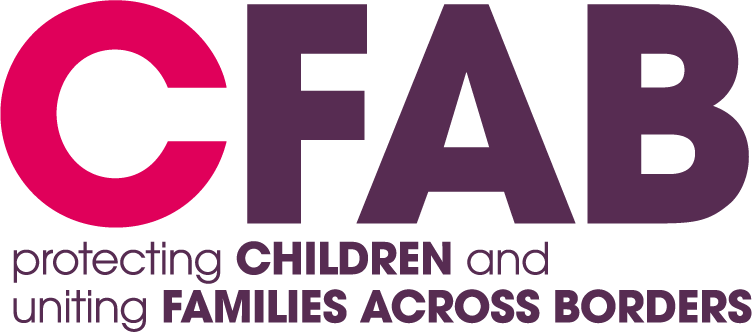Protecting children and reuniting families across borders
70 Years of Children and Families Across Borders
Donate NowOur five-year campaign to help 20,000 children
Donate NowCFAB is the only UK charity with an international children’s social work team and the only UK member of the International Social Service (ISS) network. We identify and protect the most vulnerable children who have been separated from their families in complex and often dangerous situations due to conflict, trafficking, migration, family breakdown or asylum-related issues.
Working with partners in 130 countries, we are experts in social work in an international context, cross-border child protection cases, care proceedings requiring cross-border cooperation and overseas placements.
As well as offering a wide range of case management services, we run a free national Advice Line to provide guidance and practical support on child protection issues. We also deliver specialised training in the field of international social work.
Get support from us

“I've phoned a number of times for complex cases and it has always been helpful.”


“Excellent training, I have learnt lots and feel more confident in working with other countries.”
Click here to find out where we work
%201.svg)

Amelia’s story
By the age of six, Amelia’s home life had significantly deteriorated. Her father, suffering from poor mental health and drinking too much alcohol, had become violent. Authorities removed Amelia from her home and placed her with unknown foster carers, it did not seem possible for the father’s health to improve enough for him to care for Amelia. With such a traumatic disruption in her life, Amelia’s social worker was keen to find other family members to care for her.
With the help of CFAB, Amelia’s mother was located over 10,000 miles away in New Zealand. After a thorough investigation of the mother, her mental and physical health, whether her new family would accept Amelia and their financial situation, CFAB recommended Amelia join her mother, new step-father and new half-brother. CFAB also recommended the UK social worker regularly follow up with Amelia, given her distressing history and new environment. This follow up helped identify early signs of strain and prevent family breakdown, and gave Amelia the best chance of settling into her new family life abroad.
A snapshot of 2022/23
2510
1793
331
Stat 1
In 2020/21 we helped 2,400 children through our advice line, and 439 children through our casework



Stat 2
In 2020/21 we received over 1,700 calls to our Advice Line concerning children linked to 132 different countries
Stat 3
In 2020/21 we managed 318 cross-border child protection cases, a 30% increase from the previous year.

Our Incredible Partners and Funders

.png)







































Donate to CFAB today and double you donation. One donation, twice the impact.
Click here to make a Donation
Example Case Study
Personalized Experience
Lorem ipsum dolor sit amet consectetur adipiscing elit sed do eiusmod tempor.
Creative Development
Lorem ipsum dolor sit amet consectetur adipiscing elit sed do eiusmod tempor.
Personal Coaching
Lorem ipsum dolor sit amet consectetur adipiscing elit sed do eiusmod tempor.
Online Status
Lorem ipsum dolor sit amet consectetur adipiscing elit sed do eiusmod tempor.
98%
80%
70%
Creative studio located in the city of San Francisco
Et harum quidem rerum facilis est et expedita distinctio. Nam libero tempore, cum soluta nobis.


